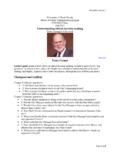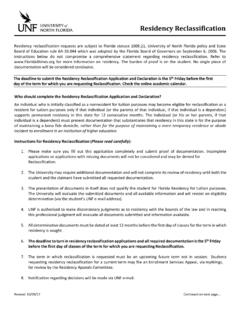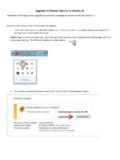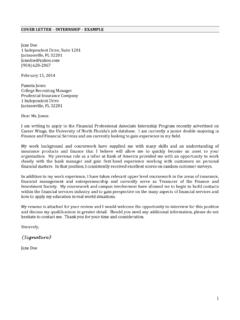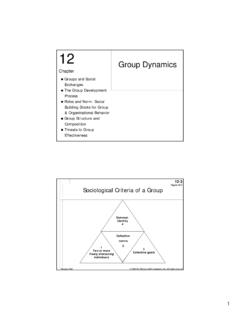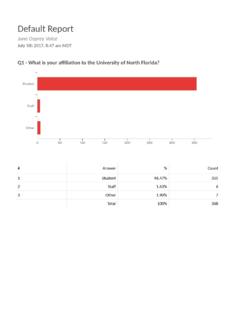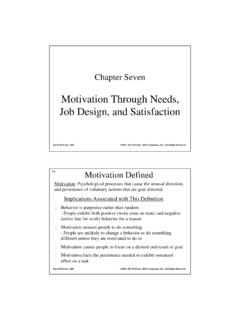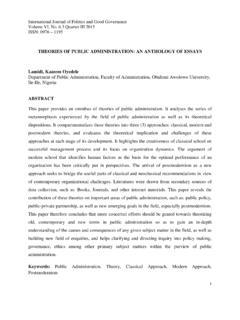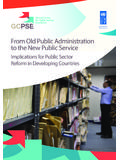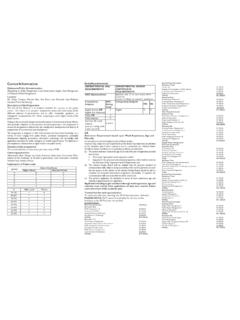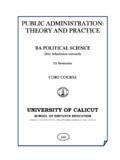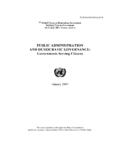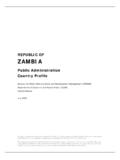Transcription of Master of public administration program PAD 5384 Civic ...
1 PAD 5384 lecture six Page 1 of 10 Master of public administration program PAD 5384 Civic groups & public policy Summer 2014 Policy formulation and evaluation Policy formulator of the week Photo credit Christina Romer Economic forecaster * Lecture goals: Introduce a range of issues surrounding the analysis of public policies, emphasizing especially how difficult this can be when Civic groups get involved! * The tobacco settlement is, for me, perhaps the paradigmatic example of irrational, even obscenely irrational public policy. My take on it goes something like this: Tobacco is, literally, more American than apple pie, having been introduced to the world by indigenous Americans. Oddly, it turns out that if you inhale the smoke from burning vegetation, it is bad for your lungs. o I blame the Boy Scouts for the delay in getting this information out. They have known for decades that when you sit on the downwind side of a fire, it is unpleasant, causing coughing, and black boogers.
2 Yet they didn't tell anyone. Coincidence, or conspiracy!!! Since early in my life, though, the harmful effects of sucking smoke into your lungs has been known. The US Surgeon General mandated that cigarette packs carry the text: "Caution: Cigarette Smoking May be Hazardous to Your Health" since 1966. I (born in 1959) remember this! But like many other potentially harmful activities (over-eating, not exercising, fighting wars on maxed-out credit cards, cheap gas, etc.) cigarettes weren't banned. Fast forward 30-40 years: class action lawsuits began to be filed against the tobacco companies. They were accused of hiding the fact that tobacco is harmful? As indicated, I find this all hard to believe, given those warning signs on the cigarette packs. So if big tobacco was trying to hide the harmful effects of tobacco, they were doing a bloody awful job of it. But our first interest group enters the scene: trial lawyers, smelling big payoffs.
3 A second interest group entered the scene shortly after: state governments. They got on the sue-big-tobacco bandwagon on the argument that they had incurred massive costs in providing the health care for people stricken with tobacco-related disease. PAD 5384 lecture six Page 2 of 10 o So even though these governments allowed the sale of these products known to be harmful, and reaped huge amounts of revenue in taxing cigarettes, they joined these lawsuits to get paid back for these health costs. A third interest group was, broadly, anti-smoking fascists. These are trendy-lefty sorts who, for whatever reason, have decided that tobacco, this ancient crop that was part of indigenous American spirituality and culture, is bad. Its use should therefore be severely curtailed. Marijuana, on the other hand, is fine for these folks and should be decriminalized, because, well, it just should. o Many of these anti-smoking sorts became a fourth interest group, as they got lucrative jobs working in tobacco cessation programs, in which a bunch of dourly dressed adults tell kids that smoking is for squares, man.
4 Of course the 'tobacco settlement' awarded kajillions of dollars to the plaintiffs: state governments. The trial lawyers took their cut, kajillions of dollars as well. o Yet who is to bear the costs: smokers themselves, of course! Tobacco companies have hiked their prices to the victims, to pay the state governments (and trial lawyers) for the costs of health care that the state governments (but not the trial lawyers) have incurred in treating smoking-related illness. o And yet America has no 'socialized' health insurance system, so a smoker who becomes ill, but isn't covered by Medicare or Medicaid, will not have her/his costs paid even though the state governments won a settlement based on the need to cover the costs of tobacco-induced illness. o The state governments, meanwhile, have been pissing away the tobacco settlement money as fast as it comes in, occasionally even selling the future rights to tobacco settlement revenues in exchange for short term cash.
5 Is this not just the wackiest public policy one can imagine? o I can imagine only one thing that would make it wackier: the same lawyers who won the kajillion dollar settlements that taxed smokers to pay for their health care costs, will now file new class action lawsuits on behalf of the smokers, suing state governments for wasting all that money. Policy formulation As indicated, policy analysis is something done in the 'formulation' stage of our model of the policy process. 'Formulation' was further divided into estimation and selection. By 'estimation' we mean analysis: gathering data and 'estimating' the parameters of the problem, the likely impact of some possible solutions, etc. To repeat the description of these sub-stages: Estimation: "Estimation continues work begun during initiation: systematic investigation of a problem and thoughtful assessment of options and alternatives are its characteristic tasks. Specifically, estimation concerns the accurate determination of all likely costs and benefits that are expected to flow from decisions taken during the subsequent, or selection, stage of the overall process.
6 Consideration is given both to the probable consequences of positive action and to those expected to result from inaction, whether intentional or not. Estimation efforts aim to reduce uncertainties about possible choices to the greatest extent possible, given time, intellectual, and other constraints" (Brewer and deLeon 1983, p. 83). PAD 5384 lecture six Page 3 of 10 There are some common elements (or steps) to this process (from Patton and Sawicki 1993): Verifying, defining and detailing the problem. Establishing evaluation criteria. Identifying alternatives. Evaluating alternative policies. Displaying alternatives and distinguishing among them. Selection: "Most simply, selection is the choice among policy alternatives that have been generated and their likely effects on the problem estimated. It is the decision-making stage of the policy process. It is the most overtly political stage insofar as the many potential solutions to a given problem must somehow be winnowed down and but one or a select few picked and readied for use.
7 Obviously most possible choices will not be realized and deciding not to take particular courses of action is as much a part of selection as finally settling on the best course. Many individuals and groups are certain not to get what they want or only obtain substantially modified versions of their preferences as a result of the consensus building and conflict resolution inherent in politics" (p. 179). Policy formulation and approaches to governance Policy formulation is actually a critical area in which differences are evident in the respective perspectives on civil society and public policy we are discussing in this class: The Bureaucratic approach: "This is why there should be a science of administration which shall seek to straighten the paths of government, to make its business less unbusinesslike; to strengthen and purify its organization, and to crown its duties with dutifulness. This is one reason why there is such a science" (Wilson 1887, p.)
8 201). In this model, policy is formulated by clever policy analysts, with their MPA degrees, their slide rules, and their pocket protectors. The market-based network approach: Human action is necessarily always The ultimate end of action is always the satisfaction of some desires of the acting man. Since nobody is in a position to substitute his own value judgments for those of the acting individual, it is vain to pass judgment on other peoples' aims and volitions. No man is qualified to declare what would make another man happier or less discontented. Ludwig Von Mises, Human Action: A Treatise on Economics (1949). In this model policy isn't so much formulated, as it results from the aggregated decisions of consumers and/or market forces. PAD 5384 lecture six Page 4 of 10 The dialogue-based network approach: "We argue that public servants have a central and important role in helping citizens to articulate the public interest, and, conversely, that shared values and collective citizen interests should guide the behavior and decision making of public administrators" (Denhardt & Denhardt 2007, pp.
9 77-8). Here, policy is formulated through a process of dialogue between citizens and government. In the comments below I'll focus more on some of the limitations of the public bureaucratic approach, in terms of the limits of analysis. The limits of analysis Given that we are looking at policy analysis, it is worth thinking a bit more about just how rigorously one can analyse many policy issues. One of my favourite all-time books was Alan Cromer's (1993) Uncommon Sense, the central argument of which was that "..scientific thinking, which is analytic and objective, goes against the grain of traditional human thinking, which is associative and subjective. Far from being a natural part of human development, science arose from unique historical factors. And viewed against the thousands of years of human existence, science is very recent" (pp. 3-4). Within the field of public policy/ administration , Charles Lindblom similarly mocked the field: "In the last century thousands of social scientists trying to practice methods much like those of the natural sciences have swarmed over institutions and social processes to try to extract exact propositions hidden to the lay mind.
10 For all that effort and for all its presumed usefulness, I cannot identify a single social science finding or idea that is indispensable to any social task or effort" (1990: 136). Though Lindblom has been one of the more productive extracters of propositions in the social sciences, so presumably he doesn't think it a wholly dispensable project. Along with new co-author Ed Woodhouse, to draw on another book that I haven't assigned this semester, Lindblom (1993) provides fodder for the first part of this lecture. Lindblom and Woodhouse start (in chapter 2) pointing to the ubiquity of policy analysis, yet question why politics so often seems to throw analysis out the window: Fallibility: o "A first obstruction to reasoned argument is that any failures in logic by even one participant will bring the collectivity to disagreement" (p. 17). o "Analysis also is fallible in more blatant ways in that much of it is poorly informed, superficial, or biased -- not infrequently making shoddy attempts to prove by specious means what someone in power has already decided to think" (p.)
